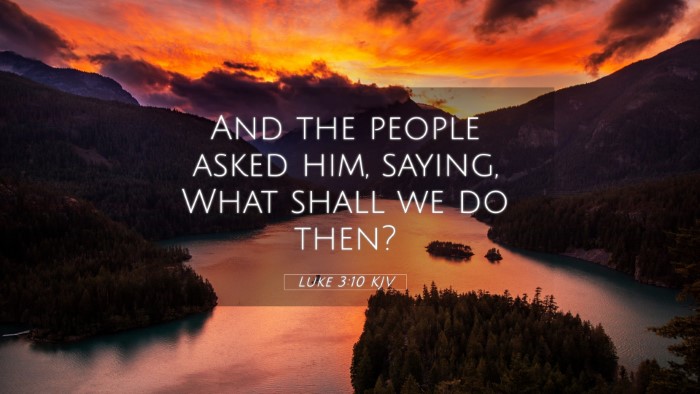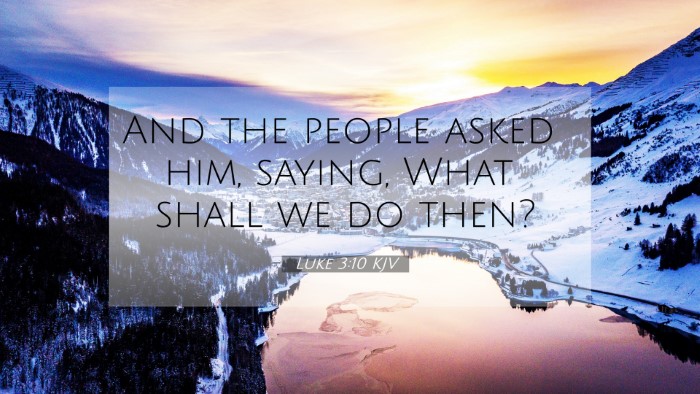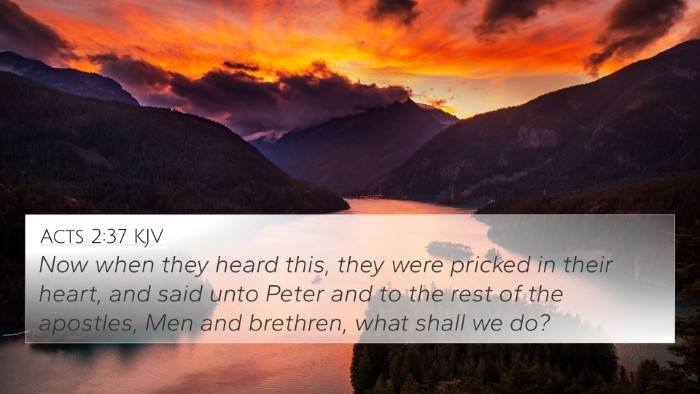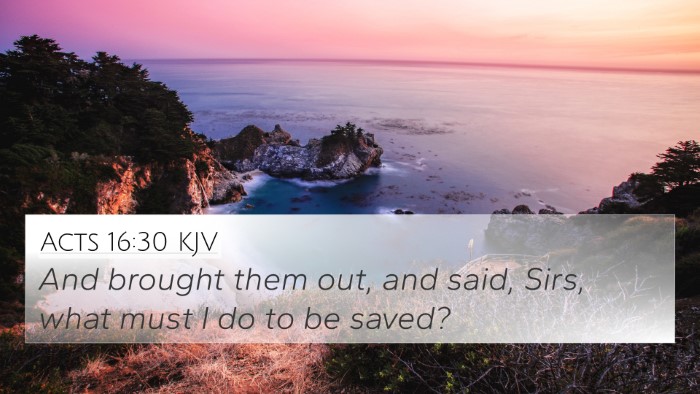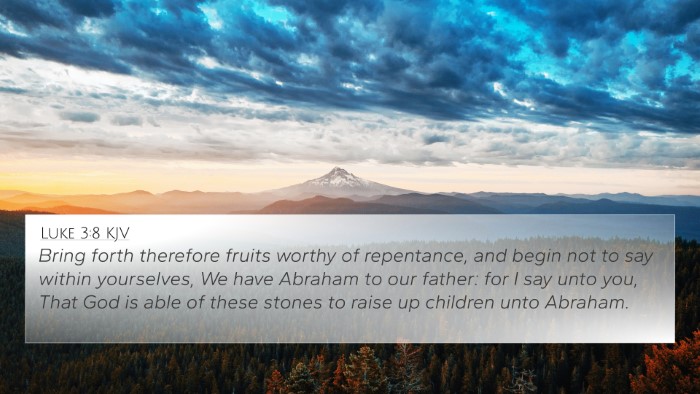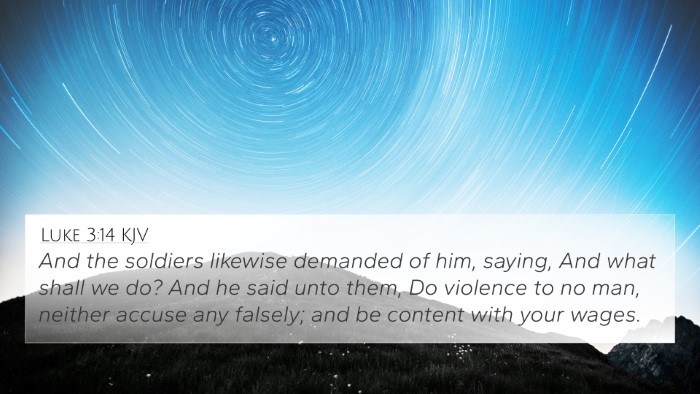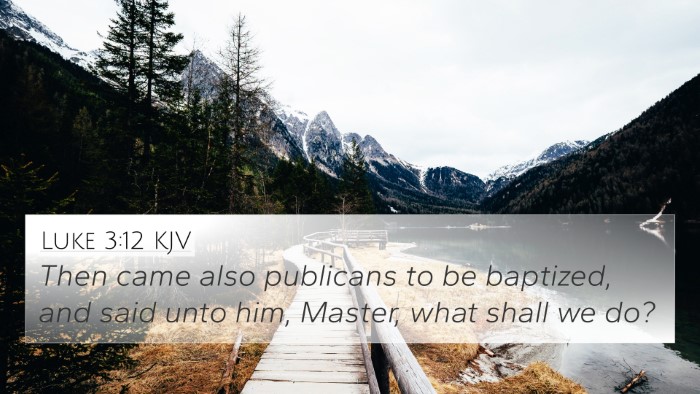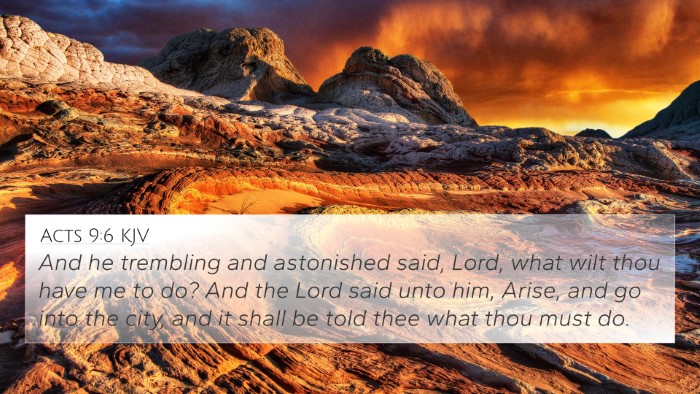Understanding Luke 3:10
In the context of Luke 3:10, we find a poignant moment where the essence of repentance and moral accountability is highlighted. This verse states, "And the people asked him, saying, What shall we do then?" indicating a deep desire for guidance after hearing the message of John the Baptist regarding repentance and preparation for the coming Messiah.
Commentary Insights
Matthew Henry notes that the question posed by the people reflects an earnest quest for practical application of John’s preaching. Their inquiry demonstrates not only curiosity but a heartfelt response to the call for repentance. It is essential to comprehend that true repentance involves actionable steps and a transformation of life.
Albert Barnes emphasizes the necessity of addressing the spiritual needs of the people. The query from the crowd signifies their readiness to change and underscores a fundamental aspect of Christian teaching – that faith must produce fruit in our lives. The question "What shall we do?" encapsulates the challenge of living out one's faith in a tangible manner.
Adam Clarke expands on the responses that are to follow, indicating that John the Baptist would provide practical examples of how to live out their repentance. This inquiry foreshadows the ethical teachings that John will impart, urging the people to embody the principle of love and justice in their daily interactions.
Related Bible Cross-References
- Matthew 3:8 - "Bring forth therefore fruits meet for repentance."
- Acts 2:37-38 - The crowd’s reaction to Peter's sermon, asking what they must do to be saved.
- James 2:17 - "Even so faith, if it hath not works, is dead, being alone."
- Luke 19:8 - The story of Zacchaeus, demonstrating practical repentance through restitution.
- Matthew 5:16 - "Let your light so shine before men, that they may see your good works..." indicating the visible expression of faith.
- Galatians 5:22-23 - The fruits of the Spirit, reflecting what true repentance should produce in one's life.
- Romans 12:1-2 - Encouragement to present oneself as a living sacrifice, indicating a response of service and obedience to God.
Thematic and Contextual Analysis
The underlying theme of Luke 3:10 revolves around the transformation that follows a heart oriented towards God. This theme resonates throughout Scripture and creates a tapestry of interconnecting messages on faith and action.
This verse resonates with the notion of Bible verse parallels as it links the inquiries of those seeking redemption and change across numerous biblical narratives. The timing of John's ministry, an essential turning point for the Israelites, provides a context for understanding the significance of repentance and the moral imperative it carries.
In seeking to understand how to apply this to modern life, one might ask, What verses are related to Luke 3:10? This inquiry leads to a range of scripture juxtaposed to the essence of repentance. For example, Identifying connections between Old and New Testament themes reveals continuity in God's expectations for His people: a life that reflects His righteousness.
Tools for Bible Cross-Referencing
Utilizing a Bible concordance can be invaluable in tracing these thematic links and identifying connections between Bible verses. This method not only enhances our understanding of individual verses but enriches our comprehension of the entire narrative arc of Scripture.
Through cross-reference Bible study, one can uncover profound truths and insights that support sermon preparation or personal study. The inter-Biblical dialogue presented in passages like Luke 3:10 urges us to respond to God's call practically, echoing themes from both the Old and New Testaments.
Conclusion
In summary, Luke 3:10 serves as a powerful reminder of the need for genuine repentance and the willingness to act upon God's word. The question posed by the people is timeless, inviting every generation to reflect on how their faith can manifest in tangible actions. Engaging with comprehensive Bible cross-reference materials enriches our understanding and motivates us to live out our faith authentically.

